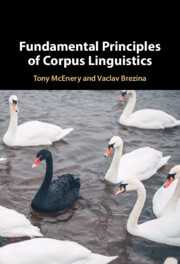Book contents
- The Fundamental Principles of Corpus Linguistics
- The Fundamental Principles of Corpus Linguistics
- Copyright page
- Contents
- Figures
- Tables
- Preface
- Introduction
- Chapter One The First Sketch
- Chapter Two What Is Science?
- Chapter Three How to Do Science?
- Chapter Four What Is Social Science and the Digital Humanities?
- Chapter Five Everyday Linguistics: Form and Function
- Chapter Six Repetition and Replication: Laying the Groundwork for an Empirical Study
- Chapter Seven Replication: Carrying out an Empirical Study
- Chapter Eight Conclusion
- Book part
- References
- Index
Chapter Five - Everyday Linguistics: Form and Function
Published online by Cambridge University Press: 22 September 2022
- The Fundamental Principles of Corpus Linguistics
- The Fundamental Principles of Corpus Linguistics
- Copyright page
- Contents
- Figures
- Tables
- Preface
- Introduction
- Chapter One The First Sketch
- Chapter Two What Is Science?
- Chapter Three How to Do Science?
- Chapter Four What Is Social Science and the Digital Humanities?
- Chapter Five Everyday Linguistics: Form and Function
- Chapter Six Repetition and Replication: Laying the Groundwork for an Empirical Study
- Chapter Seven Replication: Carrying out an Empirical Study
- Chapter Eight Conclusion
- Book part
- References
- Index
Summary
This chapter addresses the nature of the data we use in corpus linguistics and what we believe corpus data represents. In doing so, we draw not only on Popper’s framework, but also on uses of that framework by other linguists in the Prague School, Systemic Functional Linguistics and Axiomatic Functionalism. We consider a range of issues including performance errors, repairs and learner language.
- Type
- Chapter
- Information
- Fundamental Principles of Corpus Linguistics , pp. 154 - 183Publisher: Cambridge University PressPrint publication year: 2022

